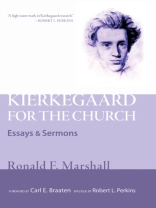Most of what is written on Kierkegaard today is for the college classroom and academic conferences. The guiding question of this book is that if Kierkegaard’s words about Christianity are true, how do they change the way we learn and practice the Christian faith today? This book is an answer to that question. It does not enter into an extended critical discussion over the truth of Kierkegaard’s ideas. Instead it just believes what Kierkegaard said and runs with it. It does that by showing how his ideas change our understanding of Christian identity, suffering and illness, worship and preaching, the Bible, baptism, prayer, marriage and divorce, criticism, and the Christian minister. Interspersed are many quotations from Martin Luther, whose thought significantly shaped Kierkegaard’s. At the end of the book is a hefty collection of sermons to show how all of this can be preached in the church.
What Kierkegaard for the Church adds to our understanding of Kierkegaard is the place of the church in his thought. Because of his criticisms of the Danish state church and his stress on the need for the single individual to appropriate Christian teachings, it could be imagined that he rejected the church. But that would be to throw the baby out with the bath. The fact is that Kierkegaard remained a loyal son of the church even while he attacked it. And he did this only so he could strengthen what he loved.
Про автора
Carl Edward Braaten is an ordained minister of the Evangelical Lutheran Church in America. He served as a parish pastor of the Lutheran Church of the Messiah in Minneapolis from 1958-1961. From 1961-1991 Braaten served as a professor of systematic theology at the Lutheran School of Theology at Chicago. In 1992 he together with Robert W. Jenson founded the Center for Catholic and Evangelical Theology in Northfield, Minnesota. For fifteen years he served as the executive director of the Center, an ecumenical organization whose mission is to cultivate faithfulness to the gospel of Jesus Christ throughout the churches, and also as the editor-in-chief of Pro Ecclesia, a journal of theology published by the Center. Braaten has authored and edited over fifty theological books, including Principles of Lutheran Theology (Fortress Press, 1983), The Future of God: The Revolutionary Dynamics of Hope (Harper & Row, Publishers, 1969), Mother Church: Ecclesiology and Ecumenism (Fortress Press, 1998), Because of Christ: Memoirs of a Lutheran Theologian (Eerdmans Publishing Company, 2010), and Who Is Jesus? Disputed Questions and Answers (Eerdmans Publishing Company, 2011), as well as hundreds of articles and editorials in various academic journals. Braaten was born on January 3, 1929 in St. Paul, Minnesota. He grew up on the island of Madagascar where his parents served as missionaries of the Norwegian Lutheran Church in America. He graduated from Augustana Academy, a Lutheran high school in Canton, South Dakota. He received degrees from St. Olaf College (B.A.), Luther Seminary (M. Div.), and Harvard University Divinity School (Th.D.). In 1951 he was a Fulbright scholar at the University of Paris (Sorbonne), in 1957 a doctoral student at the University of Heidelberg where he wrote his dissertation, and in 1967 a Guggenheim Fellow at Oxford University. In 1974 he spent a sabbatical making a worldwide lecture tour of various colleges and seminaries in Japan, China, India, Kenya, Tanzania, Madagascar, Peru, Chile, Argentina, Brazil, and Mexico. This tour resulted in a book on the universal mission of the church entitled, The Flaming Center (Fortress Press, 1977).







![Обкладинка Brian Schrag & Julisa Rowe: Community Arts for God's Purposes [Chinese] 貼近神心意的社群藝術 Обкладинка Brian Schrag & Julisa Rowe: Community Arts for God's Purposes [Chinese] 貼近神心意的社群藝術](https://static.worldofdigitals.com/thumb_webp/740/9781645083740.webp)




